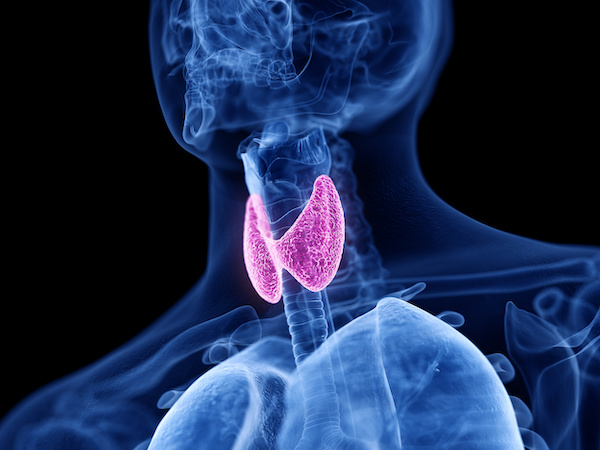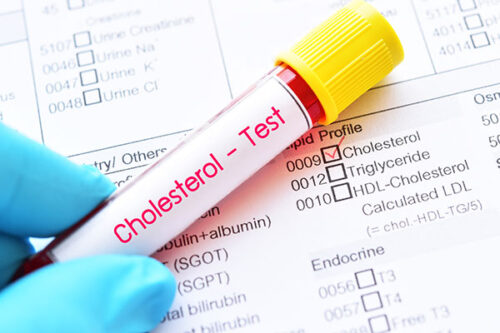Treat “High Normal” Hypothyroidism

This article originally appeared in the September 2002 McDougall Newsletter and has been updated in March 2023.
By John McDougall, MD
The normal adult thyroid gland consists of two lobes connected by an isthmus and is located in front of and below the larynx (voice box). The thyroid synthesizes several hormones. The most important ones are called L (levo) – thyroxine and triiodothyronine, and their production depends upon the entry of iodine into the thyroid gland. Thyroid hormones influence the growth and maturation of the body’s tissues, total energy expenditure of the body and the metabolism of essentially all substances in the body.
The rate of production of these hormones is based upon a feedback mechanism, like a thermostat regulates heat by adjusting the function of the furnace. When too little thyroid is produced, the pituitary gland synthesizes thyroid stimulating hormone (TSH) which stimulates the thyroid gland to make more thyroid hormone. The TSH level can be measured in the blood and is a very sensitive indicator of thyroid function. A low TSH means there is a high production of thyroid hormone (hyperthyroidism) and a high TSH means low thyroid hormone (hypothyroidism). Therefore, you do not want your TSH level to be too high or too low. Normal range for a laboratory test can be 0.49 to 4.67 mIU/ml.
Approximately 5% of women over the age of 20 have hypothyroidism. The incidence increases with age so that eventually 16% of elderly males and 21% of elderly females in the US have evidence of an underactive thyroid gland.1Hypothyroidism is often accompanied by elevated cholesterol, high blood pressure and heart disease, and is a strong indicator of risk for atherosclerosis and heart attacks, especially in elderly women. So how do people get hypothyroidism?
Autoimmunity and Thyroid Damage
The most common cause of thyroid damage and subsequent hypothyroidism (low thyroid production) is an autoimmune disease called thyroiditis. This is a condition where the body’s own immune system attacks the thyroid gland and destroys it. People who have one autoimmune disease commonly have others, like type 1 diabetes, lupus, myasthenia gravis, and/or celiac disease.2 So why would the body attack itself?
The process is called “molecular mimicry.” Proteins, often food proteins, from the intestinal tract enter the blood stream. The body recognizes these as “foreign” and makes antibodies against them, like it would to foreign proteins from a virus or bacteria. The antibodies, unfortunately, are not specific just to the food protein, but also find similar proteins on the body’s own cells. The antibody attaches to and destroys our own tissues, in this case the thyroid producing tissues. Proteins from animal-derived foods are the most likely ones to cause this reaction because they are similar to our own tissues. (We are animals. Plant proteins are so different from us they are rarely involved in this type of reaction). No one has identified the culprit protein (food) in thyroid disease, but I would not be surprised if pig and cow thyroid glands ground up into filler meats were the cause. Protein from the thyroid of a pig has been found to induce thyroiditis in experimental animals.3
Treating Hypothyroidism:
Once destroyed the thyroid gland never grows back. Therefore, the only solution is to replace the thyroid hormones with supplemental hormone in the form of pills, for example, concentrates from cow thyroid glands, or synthetic thyroid hormones, called Synthroid. I prefer the Synthroid, and one reason is the cow-derived thyroid hypothetically could be infected with microbes, such as those that cause Mad Cow Disease. I usually start with 0.125 mg of Synthroid and adjust the dose every 4 to 6 weeks depending on the body’s response as measured by the TSH level.
If the TSH value is elevated above 4 mU/L and there is an insufficient amount of free thyroid hormone in the blood (thyroxine level of less than 11 pmol/L) then the condition is considered hypothyroidism. Subclinical hypothyroidism is defined as an elevated TSH level with normal levels of thyroxine in the body. Hypothyroidism is more accurately considered a graded phenomenon with a continuum from perfectly normal to subclinical “high normal” to definite hypothyroidism.
For the following reasons I have been treating people with TSH levels elevated in the “high normal” range (2 to 4 mU/L) with thyroid replacement medication; especially if I am worried about the effects of suboptimal thyroid activity in relation to elevated cholesterol, heart disease and other form of atherosclerosis:
1) TSH levels in these ranges have been found associated with raised LDL cholesterol and low HDL cholesterol levels.4
2) A coronary angiography study found greater progress of atherosclerotic lesions in hypothyroid patients whose TSH levels were in the slightly elevated range, compared to those treated and maintained within the normal range.5
3) Impaired function of the arteries (endothelial dysfunction), which is an early sign for the development of atherosclerosis, has also been observed in individuals in the “high normal” range.6
To keep your thyroid healthy and avoid autoimmune thyroiditis eat a plant-based diet (devoid of animal products). As a part of your routine evaluation (whether performed with your doctor or independently) which should include a check of your blood pressure, cholesterol, triglycerides and blood sugar, you should also have your TSH level checked. Most doctors will only treat TSH levels well into the abnormal range. I have given you the reasons to consider supplementation at even lower levels.7
References:
1) Canaris GJ. The Colorado thyroid disease prevalence study. Arch Intern Med. 2000 Feb 28;160(4):526-34.
2) Kumar V. Celiac disease-associated autoimmune endocrinopathies. Clin Diagn Lab Immunol. 2001 Jul;8(4):678-85.
3) Brazillet MP. Induction of experimental autoimmune thyroiditis by heat-denatured porcine thyroglobulin: a Tc1-mediated disease. Eur J Immunol. 1999 Apr;29(4):1342-52.
4) Hak E. Subclinical hypothyroidism is an independent risk factor for atherosclerosis and myocardial infarction in elderly women: the Rotterdam Study. Ann Intern Med. 2000 Feb 15;132(4):270-8.
5) Perk M. The effect of thyroid hormone therapy on angiographic coronary artery disease progression. Can J Cardiol. 1997 Mar;13(3):273-6.
6) Lekakis J. Flow-mediated, endothelium-dependent vasodilation is impaired in subjects with hypothyroidism, borderline hypothyroidism, and high-normal serum thyrotropin (TSH) values. Thyroid. 1997 Jun;7(3):411-4.
7) Michalopoulou G. High serum cholesterol levels in persons with ‘high-normal’ TSH levels: should one extend the definition of subclinical hypothyroidism? Eur J Endocrinol. 1998 Feb;138(2):141-5.
Recommended Articles

Do You Know How Many Calories Are in the Food You Eat?

Cholesterol When and How to Treat It






